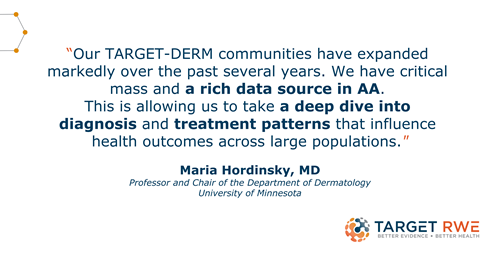Published On: 3/8/2024
Patient-Reported Outcomes Data from Longest Running Dermatology Study: TARGET-DERM AA Poster Presented at American Academy of Dermatology (AAD) 2024
Target RWE Shares Latest Updates on Enrolled Alopecia Areata, Atopic Dermatitis, Hidradenitis Suppurativa, and Chronic Spontaneous Urticaria Patients
DURHAM, N.C., March 8, 2024 /PRNewswire/ -- New patient-reported outcomes data presented at AAD 2024 from Target RWE's TARGET-DERM AA registry confirms the high unmet need and significant disease burden in patients with moderate to severe alopecia areata (AA). TARGET-DERM is the largest and most comprehensive longitudinal RWE study observing patients with immune-mediated inflammatory skin conditions in the United States.
AA is an autoimmune disease that affects about 1 in 50 people. Patients with AA have a high unmet medical need due to comorbid conditions and high impact on quality of life. The most common comorbid conditions associated with AA include vitiligo, atopic dermatitis (eczema), Hashimoto's thyroiditis, psoriasis, and systemic lupus erythematosus. Mental health comorbidities including anxiety and depression are also common due to the psychological impact of hair loss and the social stigma associated with the condition.
TARGET-DERM AA is distinctively positioned to address real-world access to care, disease progression, diagnosis, and treatment in patients with moderate to severe AA. In this large, diverse real-world cohort of AA patients, worsening clinician-reported outcomes and patient-reported outcomes of severity and quality of life were associated with increasing severity of alopecia tool (SALT) scores.

Data were analyzed from participant enrollment visits between December 2021 and July 2023 which included medical record data and baseline prospective clinician-reported and patient-reported outcomes. A significant difference in quality of life was observed with the distribution of scores in each SALT category (mild, moderate, severe). Similarly, significant differences were found in the distribution of eyebrow and alopecia totalis and alopecia universalis scores across SALT categories. Increasing scores of PGIS-AA scale (scale of symptom severity) and eyelash outcomes were associated with increasing SALT severity.
"Our TARGET-DERM communities have expanded markedly over the past several years. We have critical mass and a rich data source in AA. This is allowing us to take a deep dive into diagnosis and treatment patterns that influence health outcomes across large populations," said Maria Hordinsky, MD, Professor and Chair of the Department of Dermatology at the University of Minnesota, Minneapolis, MN. Dr. Hordinsky is a member of the TARGET-DERM AA Steering Committee.
"There are many features of immune-mediated inflammatory skin disease that are outside of the historically measured severity scores observed by clinicians. For example, alongside visible skin lesions in atopic dermatitis, other factors such as the patient's experience of itch, difficulty sleeping, and other quality-of-life measures are very important parts of the disease," said Benjamin Ungar, MD, Director of the Alopecia Center of Excellence, Rosacea & Seborrheic Dermatitis Clinic, Assistant Professor in the Department of Dermatology, Icahn School of Medicine at Mount Sinai. Dr. Ungar is also a member of the TARGET-DERM AA Steering Committee and receives compensation as an advisor.
"What's important about our data presented at AAD and TARGET-DERM AA is that we are gaining insights on the impact of the disease. There are meaningful ways that this data can help inform improved assessment and treatment by healthcare professionals, ultimately changing the trajectory of disease progression and quality of life for patients," said Michael W. Fried, MD, FAASLD, Co-Founder and Chief Medical Officer, Target RWE.
TARGET-DERM is an ongoing longitudinal, observational registry that characterizes the natural history of patients with immune-mediated inflammatory skin conditions in the real world through a consortium of academic and community sites in the U.S. and Canada. To date, Target RWE has enrolled more than 6,000+ patients in the registry with atopic dermatitis, alopecia areata, hidradenitis suppurativa, and chronic spontaneous urticaria.
About Target RWE
Target RWE generates real-world evidence (RWE) that informs strategic decisions across the drug development lifecycle. Our unique combination of clinical, analytical and technical expertise enables comprehensive insight generation from complete retrospective and prospective longitudinal patient journeys, with unparalleled scale and accuracy.
Visit our website to learn more: https://targetrwe.com/
Contact:
McKinley Peter
Digital Marketing Specialist
+1 (352) 514-8045
More News
-
06/24/2025
Target RWE Advances Next-Generation Causal Inference Approaches in Real-World Evidence with New Publications -
06/09/2025
DDG 2025 Research: Presentation by Michael Roden, MD -
05/09/2025
Target RWE at EASL 2025: Advancing HCC, MASH & PBC Research -
05/08/2025
EASL 2025 Research: Presentation by Michael Roden, MD -
05/05/2025
Ed Seguine Appointed CEO of Target RWE
